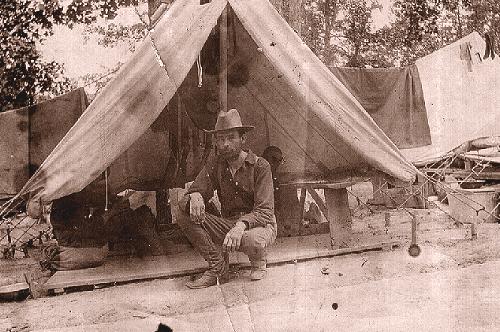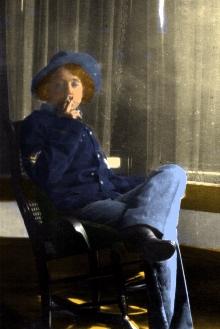
Henry Alexander Schimberg Goes to War
2nd Wisconsin Volunteer
Infantry, Co. G,
(As told by his younger
brother, Albert Paul Schimberg)
Contributed by Carin Rhoden
Please Visit our Home Page
to learn more about the Spanish American War
'Click
here to read about the history of the 2nd Wisconsin
Click here to read about
the 2nd Wisconsin on a forced march!
Click here to read
about the 2nd Wisconsin's departure for Puerto Rico!
Click here for the
roster of the 2nd Wisconsin
Click
here for information on the Battle of Coamo
Relatives of Mr. Schimberg can email
Carin Rhoden by clicking
here!
General:
This is the account of Albert Paul Schimberg describing how his
brother, Henry Alexander Schimberg went off to war with the 2nd
Wisconsin Volunteer Infantry, Co. G.
The Account:
From "Quiet Rebel" by Albert Paul Schimberg:
When one evening in April, soon after this country
declared war on Spain, the Appleton Crescent printed a list of the
soldiers who had left that day for war service, my brother's [Henry A.
Schimberg] name was missing. The next morning I marched into the Crescent
office and told them so. That evening's paper contained a little
note giving Henry's name and other names "inadvertently" omitted from the
earlier list. I continued to be as patriotic as the dickens and
intensely proud of my soldier brother, but my ardor was dampened a little
when, one evening, I happened to go upstairs and there slumped against a
window-sill I saw my mother crying her heart out. This was something
I had not reckoned with, had not expected. This was something about
war that I didn't like at all. But I kept on being proud of my
soldier brother, Henry, who had enlisted in Co. G, the Appleton unit of
the Wisconsin National Guard. It was from him that letters came to 877
Lake Street from Camp Chickamauga, Ga., and later from Puerto
Rico. Those from the Philippines
came from a cousin of my mother's, Eugene Pierrelee. Because Henry was
with the troops invading island, we were of course more interested in the
Puerto Rican than in any of the other campaigns of the war. Even
before the Wisconsin troops were landed on the island, while they were
still in camp, in this as in all wars rumors circulated in the Ward and
throughout the city, as doubtless in all other towns of the whole
country. A martinet regular army general, fat on a horse, compelled
the raw volunteers to march interminable miles under a blazing Southern
sun. In camps, nothing was done to prevent flies from visiting the
outdoor eating places after having visited the camp latrines. The
summer uniforms so sorely needed by the troops did not reach them, they
were forced to wear heavy uniforms throughout the summer in tropical
latitudes. A persistent vaudville joke even sometime after the war
ended was this: "In the Middle Ages armor saved the lives of soldiers. In
this war (Armour food) killed soldiers." Some of the stay-at-homes
of military age, or older, called the whole affair a comic opera war. It
was a contest between the American giant and a diminuative Spain, and
there was such ineptitude, such bragging, such an avid desire for
publicity as had their comical aspects. But no war, no matter how
brief, how unequal the strength of the contestants, is a comic opera
affair. It was a serious matter for the soldiers who fought and
bled, and died, and for their loved ones. The rumormongers did not
even spare the mothers and fathers of the soldiers. A rumor that
Henry had died in Puerto Rico reached his mother's, his father's, his
sweetheart's ears. Their agony of waiting, of uncertainty was not relieved
by catchwords, bombastic speeches, the reports of glorious victories by
Richard Harding Davis and the other bright young men to whom the war was a
romantically interesting adventure. In our case, the rumor proved
false. In many cases, reports of death in battle or from disease
were all too true. Before victory finally sat on our standards.

Henry Alexander Schimberg in camp
We followed the news of the Wisconsin regiment to
which Henry belonged. We did not know, then, how on one occasion, after
having been landed on Puerto Rico, the Americans were marched through a
valley between hills, from which, had they been alert, the Spaniards could
have directed a deadly fire on their enemies below. Nor did we know,
then, what havoc disease wrought among our troops and that Henry fell sick
with a tropical disease just as his regiment was about to embark for home
at the war's end. The sick, those who could not walk, were to be
left behind, to the mercy of inadequate sanitary personnel and
provisions. Then it was that my brother's knowledge of French served
him well. Determined not to be left behind, to a fate at best
uncertain, he managed to get a ride in a carriage with a number of
officers, though he was no more than a corporal. En route to the
coast, where a ship was waiting, the Americans were overtaken by nightfall
and lost. After some time they saw a light in the distance and came
upon a plantation owner's home. But the planter was not at all
friendly; did not seem inclined to offer hospitality to the tired, sick
Americanos. Something in the man's speech told Henry that he was French,
or at least spoke with a French accent. So my brother addressed him
in the French language, and at once the man grew friendly. He took
the officers and corporal into his house, dined them, opened bottles of
splendid wine, and the next morning directed them to the port and the
waiting ship.
On the Sunday in September, 1898, on which the Appleton
soldiers were to be welcomed home, the Zouaves of St. Joseph's parish
were summoned to Mass, after which they would march to the railway
station to greet the returning heroes. Well, the sermon at that
Mass was longer than even the usual lengthy sermon at St.
Joseph's. On and on droned the preacher, while we Zouaves,
especially those who had older brothers in the army, fidgeted and wished
he would finally bring his discourse to a close. When we were
finally released from church, it was too late. No proud marching
to the station for us. We were dismissed and each ran to catch up
with his soldier brother by this time nearing home. I caught up to
Henry on Brewery Hill, a few blocks from home. It has always seemed to
me that someone ought to have told the preacher that among his
supposed-to-be hearers were the parents and brothers and sisters, and
sweethearts of the soldiers. This once the sermon might have been
cut short, or omitted entirely, to give the excited people an
opportunity to be at the railway station when the troop train pulled in.

An image of Mary Schimberg, Henry's sister,
wearing his uniform and hamming it up for the camera. This version was
hand colored by computer by Carin Rhoden.
To visit the website bibliography, click
here. To visit the website video bibliography, click
here
Support
this
Site by Visiting the Website Store! (help
us defray costs!)
We are providing the
following service for our readers. If you are interested in books,
videos, CD's etc. related to the Spanish American War, simply type in
"Spanish American War" (or whatever you are interested in) as the
keyword and click on "go" to get a list of titles available through
Amazon.com.
Visit Main Page
for copyright data



